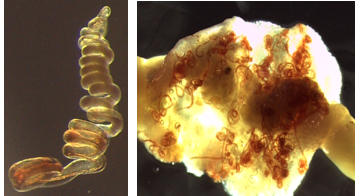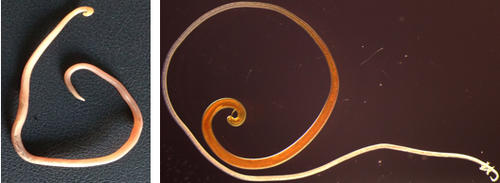Forschung
Heligmosomoides polygyrus (links), H. polygyrus-infizierter Dünndarm der Maus (rechts)
Bildquelle: F. Ebner, Institut für Immunologie, Freie Universität Berlin
Ascaris suum (links), Trichuris suis (rechts)
Bildquelle: F. Ebner, Institut für Immunologie, Freie Universität Berlin
Das wissenschaftliche Interesse des Instituts für Immunologie gilt Infektionen mit parasitischen Würmern (Abbildungen). Im Fokus stehen Mechanismen, welche es den Parasiten erlauben in ihren Wirten zu persistieren. Langfristiges Ziel ist es, Interventionsstrategien gegen Nematodeninfektionen von Mensch und Tier zu entwickeln. Zudem können die von den Parasiten im Laufe der Evolution entwickelten Immunevasionsmechanismen genutzt werden, um mit fehlgeleiteten, unabhängigen Entzündungsprozessen zu interferieren.
Forschungsschwerpunkte des Instituts von Prof. Dr. Susanne Hartmann
1. Modulation des angeborenen und erworbenen Immunsystems durch Nematoden
- Regulatorische Makrophagen in Nematodeninfektionen
- Regulatorische eosinophile Granulozyten in Nematodeninfektionen
- Th2/1 Hybridzellen in Nematoden-infizierten Patienten und Mäusen
- Th2 Gedächtnisantwort
2. Therapeutisches Potenzial von Nematoden
3. Interaktion von Nematoden mit Koinfektionen
- Reziproke Effekte einer Th2-induzierenden Endo- versus Ektoparasiteninfektion
- Toxoplasma-Nematoden Koinfektion: Umlenkung der Immunantwort
4. Nematoden und Wirtsmikrobiota
5. Immunologische Tools



